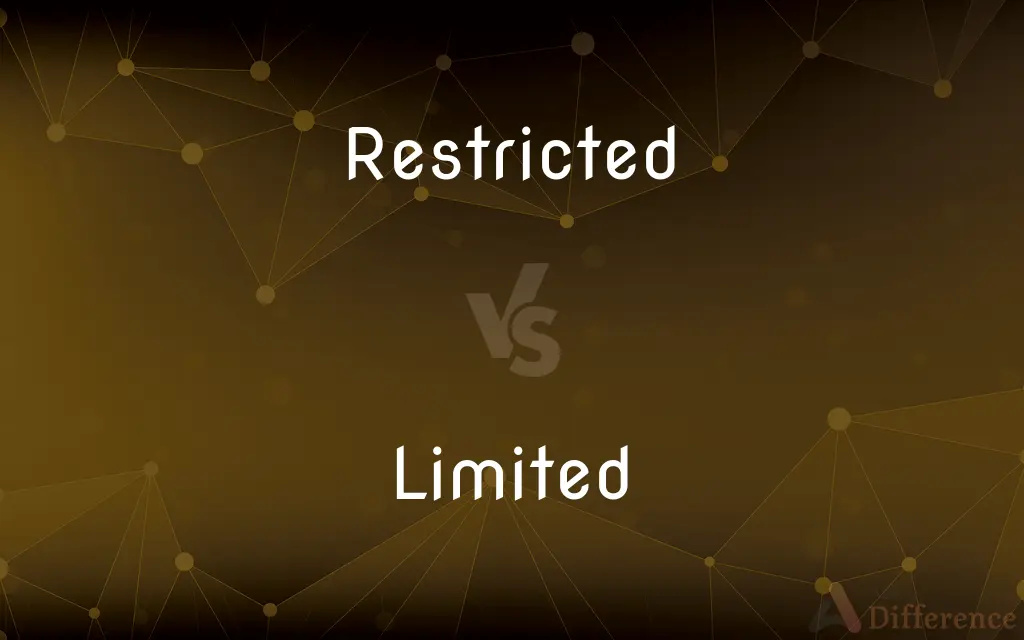Restricted vs. Limited — What's the Difference?
By Fiza Rafique & Urooj Arif — Updated on March 19, 2024
Restricted often implies access or use is controlled by specific rules, while limited suggests availability or quantity is constrained.

Difference Between Restricted and Limited
Table of Contents
ADVERTISEMENT
Key Differences
"Restricted" usually denotes that access to or use of something is controlled by rules, regulations, or barriers, often for safety, privacy, or security reasons. For instance, restricted areas in an airport are accessible only to authorized personnel. On the other hand, "limited" indicates that the availability, extent, or quantity of something is constrained or not abundant. This can refer to resources, capabilities, or time, such as limited resources in a project indicating there's only a certain amount available.
When something is described as restricted, it implies that there are explicit boundaries or conditions set by an authority that limit who can access or use it. For example, a restricted website may only be viewable to certain users with permissions. In contrast, limited does not necessarily imply that an authority has set boundaries; rather, it could be due to inherent scarcity or finite quantities, like a limited edition of a book, which means only a set number of copies exist.
Restrictions are often put in place to protect, conserve, or maintain the integrity of a system, space, or resource, and might require specific qualifications or permissions to overcome. Limited, however, suggests that even with the necessary qualifications, the scope or availability cannot be expanded beyond a certain point, such as limited seating at an event meaning only a fixed number of seats are available regardless of demand.
The context of "restricted" often carries a sense of prohibition or exclusivity, limiting access or usage to a select group or under certain conditions, emphasizing control and regulation. Whereas "limited" focuses more on the inherent or imposed scarcity of something, highlighting the finite nature or restricted availability but not necessarily through formal or regulatory means.
Both terms imply some form of constraint, but the nature and implications of these constraints differ: restricted often pertains to rules and access control, while limited speaks to the scope, availability, or capacity of something. Understanding the distinction is crucial in contexts ranging from legal and technical to everyday scenarios.
ADVERTISEMENT
Comparison Chart
Implication
Access/use is controlled by rules
Availability/quantity is constrained
Nature
Often regulatory or authoritative
Inherent or imposed scarcity
Focus
Control and regulation
Scope and capacity
Example Usage
Restricted areas, restricted access
Limited resources, limited edition
Context
Safety, privacy, security
Inherent scarcity, finite quantities
Compare with Definitions
Restricted
Implies that access or usage is strictly controlled by rules or regulations.
The restricted section of the library is only accessible to staff.
Limited
Indicates that something is constrained in availability, extent, or capacity.
The concert has limited seating, so tickets are scarce.
Restricted
Often used in security, privacy, or areas where control is necessary.
Restricted airspace prohibits unauthorized aircraft from entry.
Limited
Applies to resources, capabilities, time, or editions.
The project has limited resources, requiring efficient management.
Restricted
Carries a sense of prohibition or exclusivity.
Restricted club memberships highlight exclusivity and privilege.
Limited
Highlights scarcity or finite nature.
A limited edition print becomes more valuable due to its rarity.
Restricted
To protect, conserve, or maintain order and integrity.
Wildlife reserves are restricted areas to protect endangered species.
Limited
Often a result of conditions rather than a deliberate imposition.
The bakery's limited menu is due to the small size of the kitchen.
Restricted
Imposed by an entity or authority to ensure compliance.
The use of restricted chemicals is regulated by health and safety laws.
Limited
Not necessarily imposed by an authority but can result from inherent limitations.
Human attention span is limited, affecting learning and productivity.
Restricted
Kept within certain limits; limited
On a restricted diet.
Limited
Confined or restricted within certain limits
Has only limited experience.
Restricted
Excluding or unavailable to certain groups
A restricted area.
Limited
Not attaining the highest goals or achievement
A limited success.
Restricted
Available only to authorized persons
A restricted file.
Limited
Having only mediocre talent or range of ability
A popular but limited actor.
Restricted
Simple past tense and past participle of restrict
Limited
Having governmental or ruling powers restricted by enforceable limitations, as a constitution or a legislative body
Limited monarchy.
Restricted
Limited within bounds.
Limited
Abbr. Ltd. Of or relating to a limited company.
Restricted
Available only to certain authorized groups of people.
Restricted area
Restricted access
A restricted military document
Limited
Of, relating to, or being transportation facilities, such as trains or buses, that make few stops and carry relatively few passengers.
Restricted
Only available to customers who do not belong to racial, ethnic or religious minorities.
Limited
A limited train or bus.
Restricted
Subject to restriction or subjected to restriction;
Of restricted importance
Limited
Simple past tense and past participle of limit
Restricted
Restricted in meaning; (as e.g. `man' in `a tall man')
Limited
With certain (often specified) limits placed upon it.
Restricted
Curbed or regulated;
Controlled emotions
Limited
Restricted, small, few, not plentiful.
There are limited places available. Enrol now or you will miss out.
I have a limited understanding of quantum physics.
Restricted
The lowest level of official classification for documents
Limited
(rail) An express train that only halts at a limited number of stops.
Limited
Confined within limits; narrow; circumscribed; restricted; as, our views of nature are very limited.
Limited
Small in range or scope;
Limited war
A limited success
A limited circle of friends
Limited
Subject to limits or subjected to limits
Limited
Including only a part
Limited
Mediocre
Limited
Not excessive
Limited
Having a specific function or scope;
A special (or specific) role in the mission
Limited
Not unlimited;
A limited list of choices
Common Curiosities
What does "limited edition" mean?
It means a product is produced in a set, finite quantity, often to increase desirability or collectibility.
How is "limited" different from "restricted"?
Limited refers to constrained availability or quantity, not necessarily due to rules.
Are limited resources always scarce?
Limited resources are constrained in availability, which can lead to scarcity if demand exceeds supply.
What does "restricted" imply?
Restricted implies controlled access or usage based on specific rules or regulations.
Is "limited" always negative?
Not necessarily; limitations can foster creativity or increase value through scarcity.
How do restricted areas ensure compliance?
Through signage, surveillance, and penalties for unauthorized access.
How do restrictions affect behavior?
Restrictions can limit actions or access, guiding behavior within set boundaries for compliance or safety.
Why are some products made in limited quantities?
To increase exclusivity, desirability, or to manage resource constraints.
Can something be both restricted and limited?
Yes, an item or area can have controlled access (restricted) and be available in limited quantities.
Why are areas or resources restricted?
To ensure safety, privacy, security, or to maintain the integrity of a resource or space.
What can cause limitations?
Limitations can be due to inherent scarcity, finite quantities, or imposed constraints.
Can limitations be overcome?
Some limitations can be overcome with innovation or additional resources, while others are inherent and fixed.
What's the impact of limited availability on consumer behavior?
Limited availability can create urgency, increase demand, and drive up perceived value.
How do entities enforce restrictions?
Through regulatory measures, security protocols, and penalties for non-compliance.
What role does authority play in restrictions?
Authority sets and enforces restrictions to control access and ensure adherence to rules.
Share Your Discovery

Previous Comparison
Disguise vs. Camouflage
Next Comparison
Accrue vs. AccumulateAuthor Spotlight
Written by
Fiza RafiqueFiza Rafique is a skilled content writer at AskDifference.com, where she meticulously refines and enhances written pieces. Drawing from her vast editorial expertise, Fiza ensures clarity, accuracy, and precision in every article. Passionate about language, she continually seeks to elevate the quality of content for readers worldwide.
Co-written by
Urooj ArifUrooj is a skilled content writer at Ask Difference, known for her exceptional ability to simplify complex topics into engaging and informative content. With a passion for research and a flair for clear, concise writing, she consistently delivers articles that resonate with our diverse audience.
















































